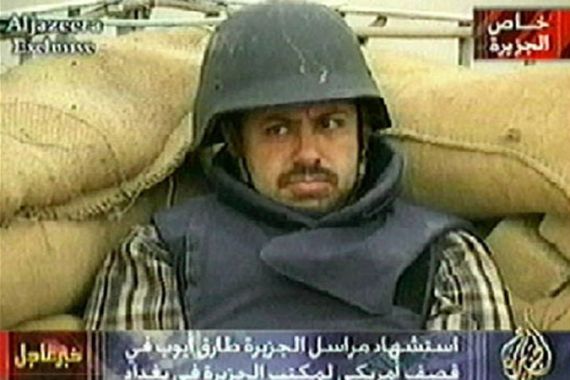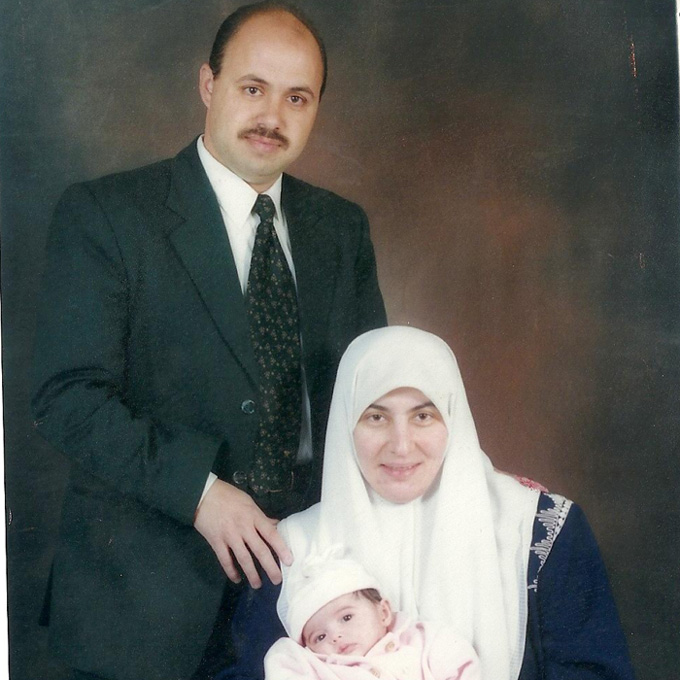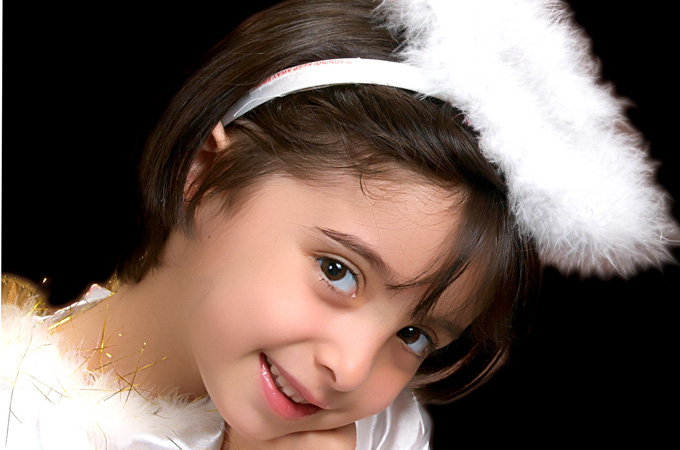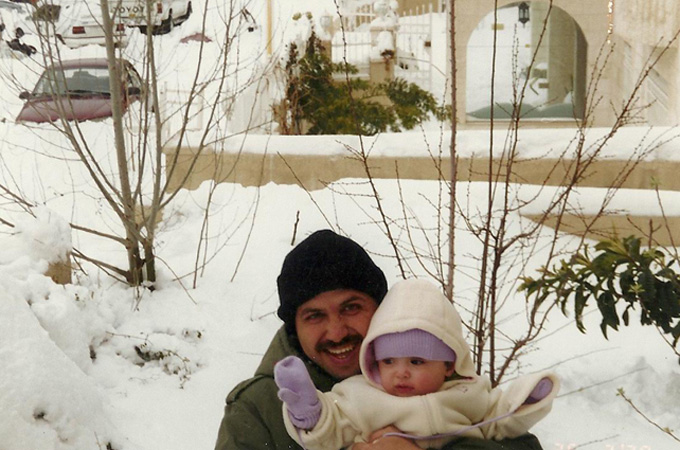Tareq Ayoub: a ‘martyr to the truth’
As American troops pull out of Iraq, Dima Tahboub, widow of Al Jazeera reporter killed in Baghdad, talks about her loss.

 |
| Tareq and Dima had been married for three years; their daughter Fatima was born in 2002 [Dima Tahboub] |
Al Jazeera correspondent Tareq Ayoub was killed in Iraq when a United States air strike slammed into Al Jazeera’s Baghdad bureau on April 8, 2003. He had given a live report just moments before he died.
The 35-year-old Jordanian became the twelfth media worker to be killed in the Iraq conflict. He had been working for Al Jazeera for three years, normally as permanent correspondent in Amman, and had only been in Iraq for three days.
His wife Dima, with whom he had a one-year-old daughter named Fatima, was interviewed by Al Jazeera on the day Ayoub was killed. Dima, who lives in Jordan and teaches at the Arab Open University in Amman, said at the time: “Eventually everyone will forget him, but we will never forget him. He is with God now.”
|
“Tareq’s death was one of many losses. His death received international attention because of his job.“ – Dima Tahboub |
She spoke to Al Jazeera’s Hasan Patel about how the war in Iraq meant the end of her young family.
Al Jazeera: Tareq was killed in Baghdad. Eight years on, what has his death meant for you?
Dima Tahboub: Tareq was killed on April 8, 2003, nine years next April. His death came as a shock for us all.
I understood Tareq was reporting a war. He had previously been to Iraq after the post-Gulf war siege and he had covered a lot of demonstrations against the war in Jordan, [he was] even arrested and taken to jail.
Iraq was just another phase in his career. I personally thought journalists and reporters came in and out of Iraq. In a conflict [I thought] nobody in their right mind would think of harming journalists. I was wrong, nobody but the USA harms or kill journalists.
Tareq’s death meant an end to our young family. We were married for three years and had Fatima, our daughter. I became a widow at the age of 27; Fatima, an orphan at the age of one year and four months. A most beloved husband, father and son had been lost for good.
AJ: How did his death impact his family and friends?
DT: As soon as the news of his death came, the concern for the family was to bring his body home. We were to see him for the last time before his burial and to rest him near us in his country where we could visit his grave regularly.
It has now been eight years since Tareq was killed, and, to be honest, the extended family has not been the same.
Both his parents mourn their son. Their health [has] deteriorated tremendously, mainly due to the sadness and [the] void Tareq’s death has left in their lives. My mother-in-law has lost all stamina and motivation for life.
My daughter has had to create an image of a father she barely remembers out of pictures and videos. For a short duration, I even left Jordan for Britain, to take up further studies, but the truth of it was I had fled in the hope to [end] my grief instead.
AJ: On the day of Tareq’s death, some media outlets described the attack on the Al Jazeera offices in Baghdad as intentional. Have you received any official explanation about what happened that day?
 |
| Fatima, now nine, was only a year old when her father was killed in Iraq [Dima Tahboub] |
DT: Officially, nothing was told to me. I have just had to rely on accounts from eyewitnesses and from Al Jazeera staff who gave recollections to me and proved that the attack was intentional.
[The] truth came out through information being presented to me from stories published in the media.
In terms of bringing those responsible to justice, a lawyer was appointed to work with myself and some Iraqi families who had lost people in the war.
We looked at options to bring those responsible to justice. Our lawyers had researched how, in Belgium, there was a law which allowed victims of unjust killings in war to lodge a prosecution [against] anyone who gave orders which resulted in the death of innocent people.
No sooner did we try and raise a case through the Belgian courts, [but] the law was amended to prevent the prosecution of heads of states and officials who then gave immunity to soldiers and army personnel who had acted upon orders.
In Jordan, there is no hope at all to gain justice from international criminals. The legal system doesn’t function properly to even attempt an international case.
AJ: What does the loss of Tareq’s life mean for you in the context of the war in Iraq?
DT: The day Tareq died was another nail in the coffin of the catastrophe for the Arabs with the fall and occupation of Iraq.
Baghdad was once a beacon of Arab civilisation and history, but in the past hundred years, things had changed from bad to worse.
Iraq [after] being enslaved by Saddam’s tyranny, had become enslaved by [the] international tyranny, mastered by the USA and sustained by the spread of terror, fear, sectarian violence and the ongoing theft of Iraq’s natural resources.
Tareq’s death was one of many losses, but his death received international attention because of his job. Yet, let us not forget the death of the thousands of Iraqis who also were killed; nobody remembers them. As the occupation ends, the rising death toll of Iraqis isn’t ending.
AJ: What do you tell people about Tareq’s contribution to the coverage of Iraq?
DT: Thankfully, I don’t have to remind anyone anything about what Tareq did.
 |
| Dima wants Fatima to follow in her father’s footsteps and realise her dreams [Dima Tahboub/Al Jazeera] |
He had spent three days in Iraq, preparing four reports and countless live coverage [spots], he even gave a live report moments before he was killed.
People will always remember Tareq as a martyr to truth, but I still would have had him remain alive, reporting the truth.
AJ: Was Tareq, in your eyes, a victim of the war in Iraq?
DT: Yes, but he is one of many, as all of Iraq has been victimised by this war.
AJ: What do you tell your daughter Fatima when she asks about her father?
DT: Raising Fatima is a labour of love; a continuous regeneration of Tareq’s memory, in my life and hers.
She was very young when her father was killed, so she doesn’t remember him. We’ve had to construct his image, personality and life from the beginning to the end.
Through pictures, videos and images, we have created an impression for Fatima to know her father. But nothing would compensate for the actual presence of her father in her everyday life.
Tareq was not there to accompany Fatima to her first day at school. Sadly, he will not be there to attend her birthdays, graduation ceremonies, or give her hand away in marriage.
I am raising my daughter to follow in the footsteps of her father in the way he would have wanted, and to allow her the opportunities to achieve her ambitions and dreams.
I also want to ensure Fatima grows up to never forget or forgive those who had deprived her of her right of having a father. Tareq was killed in an unjust way, whose death sadly, eight years on, still lingers in my mind – because his killers are still not brought to justice.
Follow Hasan Patel on Twitter: @hasanpatel